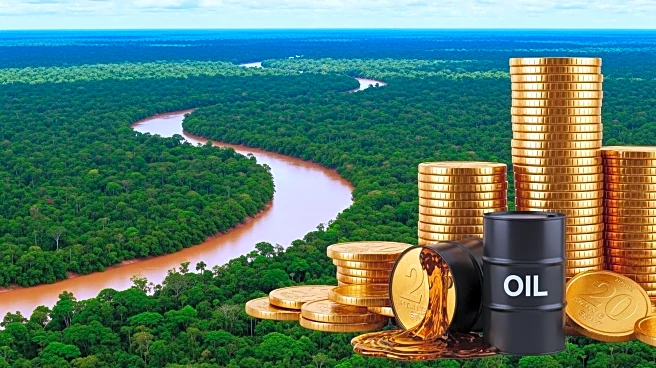What's Happening?
A recent report highlights the involvement of major banks, including JP Morgan Chase, Citi, and Bank of America, in financing oil and gas projects in the Amazon rainforest. Despite European banks like
BNP Paribas and HSBC implementing more robust policies to protect the Amazon, they have not completely ceased financing these projects. The report, led by Dr. Devyani Singh, categorizes banks based on their policies and actions regarding Amazon-specific financing and human rights safeguards. The analysis reveals that direct Amazon financing constitutes only a small portion of the total fossil fuel finance, suggesting a larger exposure. Indigenous communities and environmental groups are urging banks to halt financing fossil fuels in the Amazon, as the rainforest approaches a critical tipping point due to deforestation and climate change.
Why It's Important?
The financing of oil and gas projects in the Amazon by major banks has significant implications for environmental sustainability and Indigenous rights. The Amazon rainforest, a vital carbon sink, is at risk of becoming a carbon source due to ongoing deforestation and degradation. This threatens global climate stability and biodiversity. Indigenous communities, who bear the brunt of environmental damage, face health risks and violations of their rights. The continued financial support for extractive industries in the Amazon undermines efforts to combat climate change and protect Indigenous lands. The upcoming COP30 summit presents an opportunity for banks to commit to ending such financing, potentially marking a turning point in the financial industry's role in addressing the climate crisis.
What's Next?
Environmental groups and Indigenous leaders are calling for banks to phase out Amazon oil and gas financing by 2030, aligning with the UN Declaration on the Rights of Indigenous Peoples. The COP30 summit in Belém, located in the Amazon, is seen as a pivotal moment for banks to announce commitments to cease financing fossil fuels in the region. If banks act, it could signal a shift in the financial industry's approach to environmental and Indigenous rights issues. Failure to act may result in continued environmental degradation and social injustice, with long-term consequences for the Amazon and global climate efforts.
Beyond the Headlines
The report underscores the need for banks to close loopholes in their policies that allow continued support for controversial projects. Strengthening Indigenous rights policies and ensuring free, prior, and informed consent for projects on Indigenous lands are crucial steps. The financial industry's role in the climate crisis is under scrutiny, and banks have the opportunity to lead by example in promoting sustainable practices. The decisions made at COP30 could influence the future of the Amazon and set a precedent for global financial institutions in addressing environmental and social challenges.











